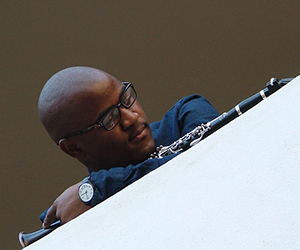Latest News Archive
Please select Category, Year, and then Month to display items
12 January 2024
|
Story Nonsindiswe Qwabe
|
Photo Sonia Small
 Since joining the UFS in 2008, Dr Grey Magaiza has worked extensively on approaches that can foster the socio-economic transformation of societies.
Since joining the UFS in 2008, Dr Grey Magaiza has worked extensively on approaches that can foster the socio-economic transformation of societies.
“The future should be one where communities can decide on their development agenda and futures. That’s the most important for me.” Dr Grey Magaiza, Deputy Director of the Centre for Gender and Africa Studies (CGAS) and Head of the Community Development programme on the Qwaqwa Campus, is passionate about capacitating communities to be agents of change and advancement. His vision for the future emphasises the empowerment of communities to take charge of their development by actively participating in decision making and the implementation of development projects that can improve their lives.
Since joining the UFS in 2008, Dr Magaiza has worked extensively on approaches that can foster the socio-economic transformation of societies. Over the years, he has crafted his research speciality into one that he is most proud of – being an interdisciplinary scientist immersed in the development of communities.
“I’m in a fortunate position of researching what I like. I say ‘fortunate’, because I’ve taken the time to understand what I’m passionate about, which is the overall field of rural livelihoods and livelihood futures – in short, community development. My research starts from an engaged university, understanding the elements that a university must use to enhance transformation and relevance to its immediate community in terms of development.”
One of the ways he has done this is by looking at social entrepreneurship as a development approach for young people in a rural setting. Through workshops with non-profit and civic organisations in Qwaqwa, Dr Magaiza has been helping these organisations to map out their needs and actively meet them through the involvement and support of external role players.
“We understand that communities are part of the national development agenda, but even that national agenda respects community knowledge and intentions and allows communities to shape their identity. A critical enabler of this is community organising. You bring back the capacity in communities to have dialogues on issues affecting them as spaces for engagement, knowledge exchange, and for people to just talk about their way forward.”
By enabling communities to define their development agenda, they can address their specific needs, challenges, and aspirations, he said. “When I look at livelihood futures, it’s quite an exciting aspect of my work – it’s like looking into a fortune tellers’ globe, because you’re not deciding for communities what they should do, but the communities themselves take those decisions.”
OSM students off to Canada and Belgium
2016-07-01
 Naledi Dweba will have the opportunity to
Naledi Dweba will have the opportunity to
take part in tutorials such as reed making
and instrument adjusting when attending
the Belgian Clarinet Academy. Photo: Supplied
Although he is only a first-year student at the Odeion School of Music (OSM), he will learn from, and share his knowledge with, the best in the world. Tuhafeni Michael from the University of the Free State has been selected for an international choral music residency at the Kokopelli Choir Association in Edmonton, Canada during June-July 2016.
Michael and Naledi Dweba are two OSM students that will enhance their skills abroad. Dweba, one of Danré Strydom’s clarinet students, has received a scholarship to attend the 2016 Belgian Clarinet Academy in Ostend, Belgium from 6-12 July.
Guest speaker at celebrations
Apart from receiving extensive training as choral conductor, Michael will also serve as a guest speaker during the Kokopelli Choir Association 20th anniversary. He will teach choral music from his native Namibia.
After the residency, he is expected to serve as an ambassador for the Kokopelli Foundation in Southern Africa. Apart from sharing his skills, he will also assist in recruiting new talented students, and act as mentor to other aspiring choral conductors.
“I’m hoping to really learn from some of the best choral conductors of our times, as well as from fellow students attending the course,” says Michael.
Masterclasses in rest of Europe
Dweba’s scholarship provides a week-long, intensive immersion in clarinet. Individual students receive at least 3 intensive private lessons, and participate in clarinet ensembles, receive chamber music coaching, observe and perform in masterclasses. The main instructors of the event will be Robert Spring (Arizona State University), Eddy Vanoosthuyse (Brussels Philharmonic Orchestra), and Deborah Bish (Florida State University).
After the scholarship, he will attend masterclasses in Germany and the United Kingdom.